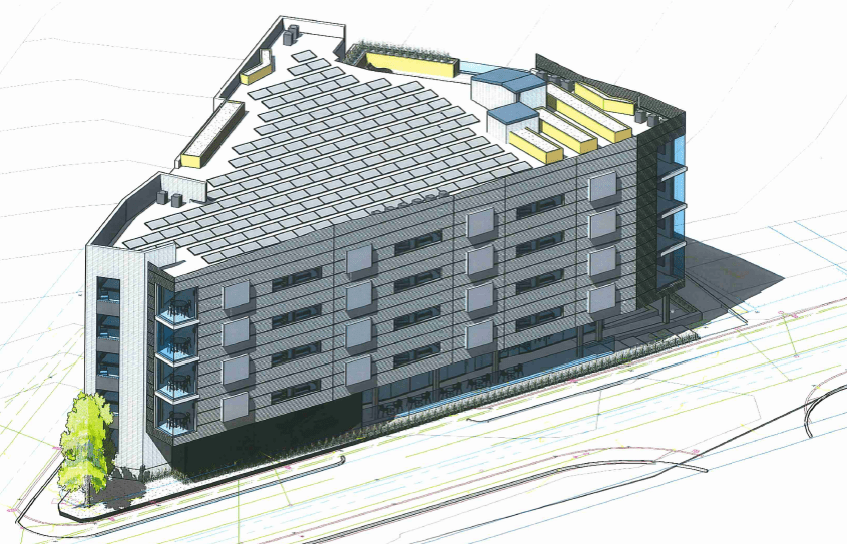LYNN — The former Smuggler’s Cove Pub was torn down last week and plans are for the Washington Street property to be redeveloped into condominiums with commercial space.
Neighborhood Development Associates, Inc., the development arm of Lynn Housing Authority and Neighborhood Development, is in charge of the $12 million to $15 million project, with administrative support from LHAND.
The mixed-use five-story development at 826 Washington St. will include 27 condominium units with two commercial spaces, or 2,200 square feet, on the first floor, according to Jeff Weeden, manager of planning and development for LHAND and project manager.
The two-bedroom condominiums will average 1,200 square feet and are projected to cost $400,000. The building’s frontage will be looking at North Shore Community College and its roof deck will be facing the Lynnway and have water views, Weeden said.
Neighborhood Development Associates purchased the property, along with another parcel that is part of the development, for $415,000 in 2008, according to land records.
Charles Gaeta, LHAND executive director, said they purchased the property off of the owner who foreclosed on the bar. He said Smuggler’s had been closed for at least several years at the time.
Weeden said the original plan was to incorporate the landmark flatiron Smuggler’s building into the development but its condition was just too far gone. He said water got in between the bricks and the walls were in rough shape.
He said LHAND began looking more closely at developing the property in the past couple of years. When NDA purchased the property, there was no real plan in place for it, but the vision was to redevelop the neighborhood, Gaeta added.
The Smuggler’s redevelopment project is the second phase of the LHAND’s Washington Street Gateway District Plan, which was completed by Sasaki Associates in 2008 and was aimed at revamping the whole corridor.
The first phase was the recently completed Gateway North, a $31 million, 71-unit mixed-income and mixed-use development on Washington Street.
Weeden said NDA had been quietly acquiring land and banking parcels in the Washington Street corridor for 10 to 15 years.
According to the District Master Plan, the plan for the Washington Street Gateway is to create more value between the downtown and the Sagamore Hill community by building new mixed-use developments, restoring the older buildings that are contributing to the streetscape and history of Sagamore Hill, and creating infill projects on currently vacant or underutilized land.
The plan’s ultimate goal was to improve neighborhood quality while making a connection back to the downtown.
Weeden cited an earlier housing market study in 2003, which identified the lower Washington Street-Sagamore Hill neighborhood, bounded by Washington Street, as one of the areas of the city that needed a facelift.
In addition, the former Fran’s Place property on Washington Street is being redeveloped into commercial space with 14 rental units upstairs, which is near completion.
Between Gateway North, Fran’s Place and the new planned development at the Smuggler’s site, the neighborhood will see an increase of more than 100 units of residence and another 200 to 250 people, Gaeta said.
Weeden said LHAND received a $250,000 Urban Agenda grant from the Baker administration in 2015, which paid for a majority of the environmental testing and about half the design phase of the current redevelopment project.
Gaeta said NDA will be paying for a portion of the redevelopment of the former pub property. The project will also be paid for through financing and a construction loan.
Weeden said work is expected to get underway on redeveloping the former Smuggler’s property in the fall. The transit-oriented development is close to the commuter rail, which he said would be a good fit for the Boston commuter who doesn’t rely on a car.
James Cowdell, Economic Development & Industrial Corporation of Lynn (EDIC/Lynn) executive director, said Gaeta started talking about the vision for the area about a decade ago.
“It’s changing, obviously for the best, that entire city block on the lower Washington area,” Cowdell said. “Through LHAND’s efforts, we were able to acquire properties, replace eyesores and dramatically improve a neighborhood.”

